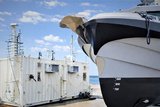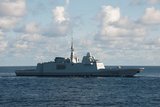Keel laid for first Indonesian naval frigate
The Damen Schelde Naval Shipbuilding (DSNS) programme to supply two SIGMA Frigates to the Indonesian Navy has achieved a new milestone with a keel-laying ceremony for the first vessel taking place at the PT PAL (Persero) Shipyard in Surabaya, Indonesia, on 16 April.
The company said that the construction of the four modules being built at PT PAL (Persero) Shipyard Surabaya, and the two modules being built in Vlissingen, the Netherlands, are proceeding according to schedule. All modules will be assembled at the PT PAL (Persero) Shipyard, ahead of Harbour Acceptance Tests and Sea Acceptance Trials.
DSNS signed a contract with the Indonesian Ministry of Defence for the first SIGMA 10514 PKR Frigate in December 2012. The contract for the second SIGMA 10514 PKR frigate was signed on 14 February 2013, with construction for this vessel scheduled to begin in approximately three months.
The frigates are being acquired as part of plans to modernise the Indonesian Navy. The vessels will provide a range of capabilities for deployment in naval warfare, maritime security and humanitarian support roles.
More from Naval Warfare
-
![Is the US Navy’s Golden Fleet initiative achievable?]()
Is the US Navy’s Golden Fleet initiative achievable?
The effort to provide the US Navy with Trump-class battleships might face financial, production and doctrinal obstacles.
-
![How will SAFE shape naval procurement for Canada and its highest-receiving members?]()
How will SAFE shape naval procurement for Canada and its highest-receiving members?
Canada’s inclusion on the EU’s Security Action for Europe initiative is set to enhance the country’s defence procurement strategy with important implications for some of its naval programmes, while Poland and Romania have also secured significant SAFE funding.
-
![Thales wins DE&S contract for portable autonomous command centres]()
Thales wins DE&S contract for portable autonomous command centres
The agreement to provide portable autonomous command centres to the UK Royal Navy will enhance the service’s Mine Counter Measure operations and further integrate autonomous and uncrewed systems into its fleet.
-
![Maritime defence in the Mediterranean faces challenges from vulnerable land power]()
Maritime defence in the Mediterranean faces challenges from vulnerable land power
As an indispensable energy crossroads, the Mediterranean is at serious risk from grey zone disruption. As navies increasingly employ AI data centres, what happens when cutting-edge defence technologies rely on the very infrastructure most susceptible to hybrid tactics?























